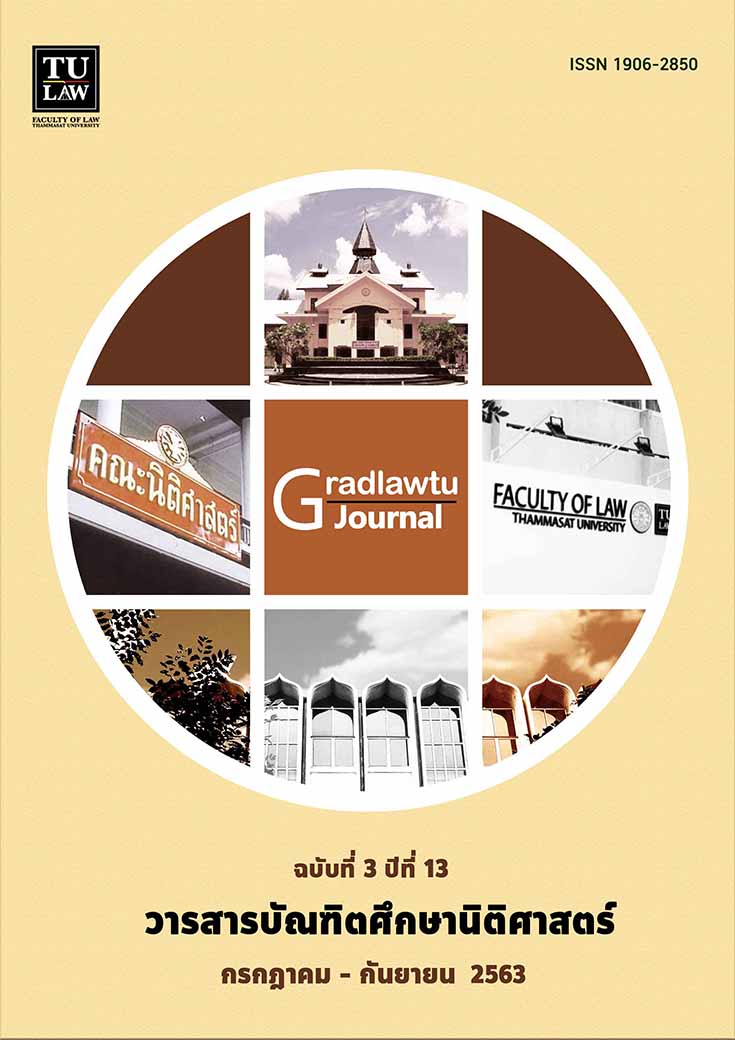ยกเลิกโทษจำคุก : ศึกษากรณีการยื่นบัญชีทรัพย์สินและหนี้สิน
คำสำคัญ:
ยกเลิกโทษจำคุก, บัญชีทรัพย์สินและหนี้สิน, กฎหมายอาญาเฟ้อบทคัดย่อ
บทความนี้มุ่งศึกษาการกำหนดโทษจำคุกในความผิดเกี่ยวกับการยื่นบัญชีทรัพย์สินและหนี้สิน ทั้งกรณีจงใจไม่ยื่นบัญชีทรัพย์สินและหนี้สิน และกรณีจงใจยื่นบัญชีทรัพย์สินและหนี้สินด้วยข้อความอันเป็นเท็จที่ไม่เหมาะสมและไม่สอดคล้องกับหลักทฤษฎีทางกฎหมายอาญา
จากการศึกษา พบว่า การตรวจสอบบัญชีทรัพย์สินและหนี้สินนั้น เป็นมาตรการที่มีขึ้นเพื่อป้องกันการทุจริต โดยมีการกำหนดให้มีการยื่นบัญชีทรัพย์สินและหนี้สิน เพื่อเป็นการช่วยอำนวยความสะดวกของรัฐในการหาข้อมูลในการตรวจสอบความร่ำรวยผิดปกติ อันนำไปสู่กระบวนการร้องขอให้ทรัพย์สินตกเป็นของแผ่นดิน ซึ่งเป็นมาตรการในทางแพ่ง จึงเห็นว่า การกำหนดให้มีโทษจำคุกในความผิดดังกล่าวจึงไม่สอดคล้องกัน เพราะรัฐยังคงมีบทลงโทษจำคุกในความผิดฐานทุจริตอื่น ๆ ได้ในหลายฐานความผิดด้วยกัน นอกจากนี้ ความผิดเกี่ยวกับการยื่นบัญชีทรัพย์สินและหนี้สินดังกล่าวเป็นความผิดเพราะมีกฎหมายห้าม ไม่ได้มีความชั่วร้ายในตัวเอง การกำหนดให้มีโทษจำคุกจึงไม่ได้สัดส่วนกับความร้ายแรงของความผิด และยังไม่ใช่มาตรการสุดท้ายที่จะใช้บังคับได้ผล อีกทั้งยังไม่สอดคล้องกับหลักเกณฑ์ในการกำหนดความผิดที่มีโทษอาญาอีกด้วย โดยจากการศึกษากฎหมายต่างประเทศพบว่ามีหลายประเทศที่ไม่ใช้โทษจำคุกกับความผิดเกี่ยวกับการยื่นบัญชีทรัพย์สินและหนี้สิน
ด้วยเหตุดังกล่าว จึงสมควรยกเลิกโทษจำคุกในความผิดเกี่ยวกับการยื่นบัญชีทรัพย์สินและหนี้สิน ทั้งกรณีจงใจไม่ยื่นบัญชีทรัพย์สินและหนี้สิน และกรณีจงใจยื่นบัญชีทรัพย์สินและหนี้สินด้วยข้อความอันเป็นเท็จ
ดาวน์โหลด
เผยแพร่แล้ว
ฉบับ
ประเภทบทความ
สัญญาอนุญาต
บทความหรือข้อความคิดเห็นใด ๆ ที่ปรากฏในวารสารบัณฑิตศึกษานิติศาสตร์เป็นความรับผิดชอบของผู้เขียนบทความโดยเฉพาะ คณะนิติศาสตร์ มหาวิทยาลัยธรรมศาสตร์ และกองบรรณาธิการไม่จำเป็นต้องเห็นด้วย



